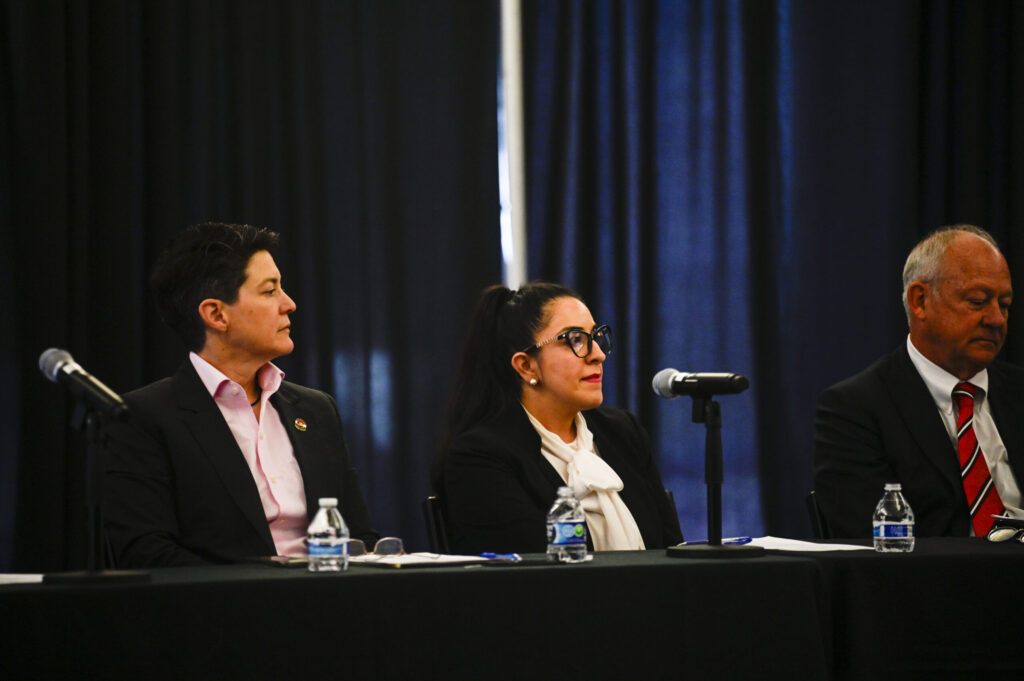Boulder County residents cannot sue over firearm discharge on federal land, appeals court rules
Colorado’s second-highest court ruled on Thursday that two residents of Boulder County could not sue the county’s commissioners for walking back a policy originally banning firearms discharge on nearby land owned by the U.S. government.
Boulder County leaders enacted a resolution in 2022 expanding the area near Sugarloaf Mountain in which it was unlawful to discharge a gun or shoot a bow and arrow. However, the board of county commissioners partially rescinded the policy in 2024 after hearing concerns that it could not regulate hunting on the U.S. Forest Service land included in the no-discharge zone.
Two residents whose property was adjacent to Forest Service land petitioned for judicial review, arguing the board’s latest decision caused them “risk of significant bodily harm” and put them in “constant fear for their lives and safety.” But a three-judge Court of Appeals panel decided the plaintiffs had not shown an entitlement to sue.
“Plaintiffs’ amended complaint does not allege that the BOCC directly caused them injuries,” wrote Judge Rebecca R. Freyre in the July 17 opinion. “Indeed, the fear and threat of physical harm alleged requires actions by third parties (hunters), not the BOCC. And an act that permits a third party to engage in conduct that impacts a plaintiff is too indirect and incidental to constitute an injury in fact.”
Colorado legislators adopted a law in 1966 permitting counties to prohibit firearm discharge for unincorporated areas that reached a certain population threshold and after the county holds a hearing. Beginning in 1971, Boulder County passed the first of a series of resolutions closing the Sugarloaf area to firearm discharge. In December 2022, the board enacted the most comprehensive ban — and swept in Forest Service land.
“The situation in the mountains is very bad and someone is going to be wounded or killed, and have additional wildfire starts,” said then-Commissioner Matt Jones. “We’ve used the powers available to us to address these critical safety concerns while we work with our partners on a more complete solution.”
However, the board began receiving complaints questioning the county’s authority to ban firearm discharge for hunters on federal land. In December 2023, Commissioner Claire Levy emailed Sugarloaf area residents that the board “reluctantly” had concluded the no-discharge zone could open the county to a legal challenge. There was a “high risk” Boulder County would lose, she added.
At a May 2024 hearing, the board passed a new resolution reinstating firearm discharge for hunters on the adjacent Forest Service land.
Anita Moss, Robert Westby and their organization, Colorado Advocates for Public Safety, petitioned for judicial review, claiming there was insufficient evidence to support the board’s decision.
In September, then-District Court Judge Bruce Langer granted the board’s motion to dismiss the lawsuit. He noted the alleged injuries were “generalized” and would only come to pass if a hunter discharged their firearm near the plaintiffs’ property and the projectile came onto their land.
“The Court finds Plaintiffs’ circumstance analogous (to) those of a resident of a municipality which decides to increase the speed limits on its streets,” Langer wrote. “While there is a common-sense argument that the decision subjects the resident to an increased risk of injury, the risk is not particularized to any individual. Also, as here, the risk requires action by a third-party.”
The plaintiffs turned to the Court of Appeals, emphasizing the nuisances allegedly caused by nearby hunters, including the killing of a neighbor’s dog.
The plaintiffs “assert that both rifle and bow hunting has taken place near their property, and they have found leftover blades from such activity on the ground near their home, plain evidence of the presence of hunting adjacent to or even on their property, which further threatens their physical safety,” wrote their lawyers.
The Court of Appeals panel agreed with Langer. Freyre wrote that the board complied with the 1966 law for designating no-discharge areas. Further, the plaintiffs had challenged the 2024 resolution as a quasi-judicial decision, but it was, in fact, legislative in nature.
“Unlike a quasi-judicial proceeding, the BOCC did not apply existing legal standards to facts developed at the hearing; instead, it sought public input before making a policy decision,” she wrote.
The case is Colorado Advocates for Public Safety et al. v. Stolzmann et al.
Colorado Politics Must-Reads:












